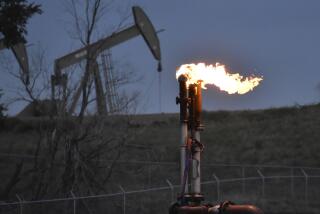Fuel Additive Pollution Widespread, Study Says
CHICAGO — The gasoline additive MTBE, which has been blamed for contaminating ground water, is turning up in fuel supplies in states where it is not required, a researcher said Thursday.
Reynaldo D. Barreto, associate professor of chemistry at Purdue University North Central, in Westville, Ind., said that means the entire country is potentially at risk of pollution.
Barreto, who wants an immediate ban on the chemical, thinks the additive is being spread by tanker trucks, storage facilities and pipes that once held gasoline containing MTBE.
MTBE, or methyl tertiary butyl ether, is added to gasoline to make it burn cleaner, but it has been linked to cancer. Several states have banned the additive. In California, oil companies have until the end of next year to phase out its use.
“It has so permeated the fuel distribution system that it is a potential threat in areas where it is not in use,” said Barreto, who presented his findings at a National Chemical Society meeting.
MTBE also is found in cities where it is not required because it is a common octane enhancer in premium-grade gasoline, said Paul Torstrick, a member of the Illinois Petroleum Marketers Assn. board of directors.
“That’s why we’re seeing traces of it all around the country; it’s not something unique to just clean-air markets,” Torstrick said.
Barreto based his research on more than 200 samples collected from gasoline stations in Indiana, Illinois and Michigan--states where MTBE use is not required.
More than 70% of the samples in all three states contained MTBE, and 25% of the samples contained significant amounts, Barreto said.
In Indiana, 40% of the gas stations sampled contained a significant amount of MTBE, more than 500 parts per million, Barreto said. He said 1 ounce of MTBE can contaminate 1,000 tons of water.
“I put my study up as a warning that this problem is bigger than anyone is willing to admit,” he said. “It just amazes me how little people know about it around here.”
A study released last year by the U.S. Geological Survey and the Oregon Graduate Institute’s Department of Environmental Study said about a third of drinking water wells in 31 states might be contaminated with MTBE.
More to Read
Sign up for Essential California
The most important California stories and recommendations in your inbox every morning.
You may occasionally receive promotional content from the Los Angeles Times.










